AREA OF RHOMBUS WORKSHEET
Subscribe to our ▶️ YouTube channel 🔴 for the latest videos, updates, and tips.
1. If the lengths of the diagonals of a rhombus are 16 cm and 30 cm, find its area.
2. Find the area of the rhombus shown below.
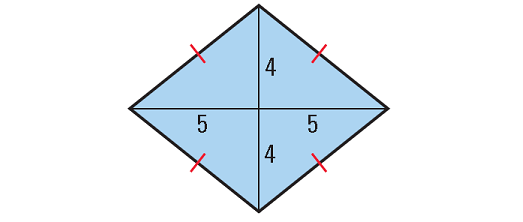
3. Area of a rhombus is 192 square cm. If the length of one of the diagonals is 16 cm, find the length of the other diagonal.
4. Area of a rhombus is 120 square units. If the lengths of the diagonals are 10 units and (7x + 3) units, then find the value of x.
5. Area of the rhombus shown below is 48 square inches. What is the value of x ?
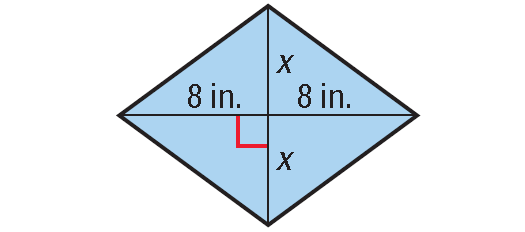
6. Find the area of the rhombus shown below.
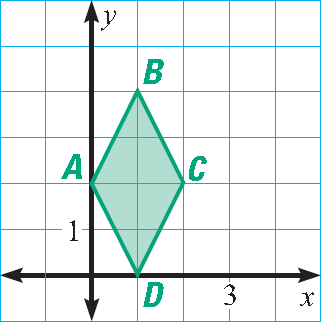
7. Find the area of the rhombus having each side equal to 17 cm and one of its diagonals equal to 16 cm.
8. The area of a rhombus is 150 cm2. Thelength of one of its diagonal is 10 cm. The length of the other diagonal is
a) 25 cm b) 30 cm c) 35 cm d) 40 cm
9. One of the diagonals of a rhombus is double the other diaognal, Its area is 25 sq.cm The sum of the diagonal is :
a) 10 cm b) 12 cm c) 15 cm d) 16 cm
10. The pereimeter of the rhombus is 56 m and its height is 5 m. Its area is
a) 64 sq.cm b) 70 sq.cm c) 78 sq.cm d) 84 sq.cm

1. Answer :
Formula for area of a rhombus :
= 1/2 ⋅ (d1d2)
Substitute 16 for d1 and 30 for d2.
= 1/2 ⋅ (16 ⋅ 30)
= 8 ⋅ 30
= 240 cm2
So, area of the rhombus is 240 square cm.
2. Answer :

In the rhombus shown above,
d1 = 5 + 5 = 10 units
d2 = 4 + 4 = 8 units
Formula for area of a rhombus :
= 1/2 ⋅ (d1d2)
Substitute 10 for d1 and 8 for d2.
= 1/2 ⋅ (10 ⋅ 8)
= 5 ⋅ 8
= 40
So, area of the rhombus is 40 square units.
3. Answer :
Area of the rhombus = 192 cm2
1/2 ⋅ (d1d2) = 192
Substitute 16 for d1.
1/2 ⋅ (16 ⋅ d2) = 192
8 ⋅ d2 = 192
Divide each side by 8.
d2 = 24 cm
So, the length of the other diagonal is 24 cm.
4. Answer :
Area of the rhombus = 120 cm2
1/2 ⋅ (d1d2) = 120
Substitute 10 for d1 and (7x + 3) for d2.
1/2 ⋅ [10(7x + 3)] = 120
5(7x + 3) = 120
Divide each side by 5.
7x + 3 = 24
Subtract 3 from each side.
7x = 21
Divide each side by 7.
x = 3
5. Answer :

In the rhombus shown above,
d1 = 8 + 8 = 16 units
d2 = x + x = 2x units
Given : Area of the rhombus is 48 square inches.
Then,
1/2 ⋅ (d1d2) = 48
Substitute 16 for d1 and 2x for d2.
1/2 ⋅ (16 ⋅ 2x) = 48
8 ⋅ 2x = 48
16x = 48
Divide each side by 16.
x = 3
6. Answer :

Measure the lengths of the diagonals AC and BD.
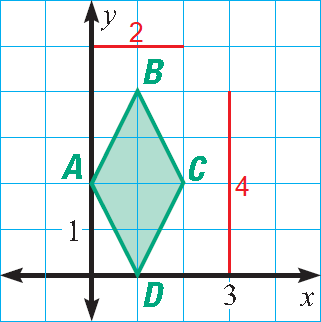
The lengths of the diagonals are 4 units and 2 units.
Formula for area of a rhombus :
= 1/2 ⋅ (d1d2)
Substitute 4 for d1 and 2 for d2.
= 1/2 ⋅ (4 ⋅ 2)
= 2 ⋅ 2
= 4
So, area of the rhombus is 4 square units.
7. Answer :
Let A, B, C and D be the vertices of the rhombus.
The diagonals of a rhombus will be perpendicular and they will bisect each other.
Then, we have
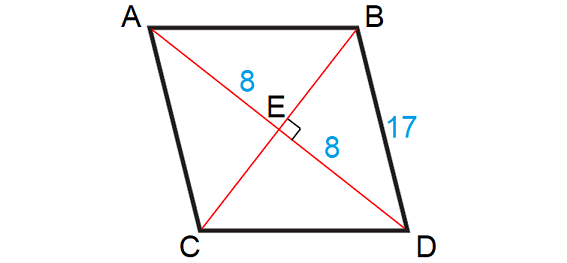
In the above rhombus, consider the right angled triangle BDE.
By Pythagorean Theorem,
BD2 = BE2 + DE2
172 = BE2 + 82
289 = BE2 + 64
Subtract 64 from each side.
225 = BE2
152 = BE2
15 = BE
Then,
EC = 15
Length of the diagonal BC :
BC = BE + EC
BC = 15 + 15
BC = 30 units
So, the lengths of the diagonals are 16 units and 30 units.
Formula for area of a rhombus :
= 1/2 ⋅ (d1d2)
Substitute 16 for d1 and 30 for d2.
= 1/2 ⋅ (16 ⋅ 30)
= 8 ⋅ 30
= 240
So, area of the rhombus is 240 square units.
8. Answer :
Area of a rhombus = 150 cm2
Length of one diagonal = 10 cm
Let x be the length of other diagonal.
(1/2) ⋅ x ⋅ 10 = 150
5x = 150
x = 150/5
x = 30
So, the length of other diagonal is 30 cm. Option b is correct.
9. Answer :
Area of a rhombus = 25 cm2
Let x be the length of one diagonal. Then the other diagoanl will be 2x.
(1/2) ⋅ x ⋅ (2x) = 25
x2 = 25
x = 5 cm
2x = 2(5) ==> 10 cm
Sum of the diagonal = 5 + 10
= 15 cm
So, option c is correct.
10. Answer :
The pereimeter of the rhombus = 56 m
height = 5 m
Let x be the side length of rhombus.
4x = 56
x = 56/4
x = 14 m
Area of rhombus = base x height
= 14 x 5
= 70 m2
Subscribe to our ▶️ YouTube channel 🔴 for the latest videos, updates, and tips.
Kindly mail your feedback to v4formath@gmail.com
We always appreciate your feedback.
About Us | Contact Us | Privacy Policy
©All rights reserved. onlinemath4all.com

Recent Articles
-
Digital SAT Math Problems and Solutions (Part - 1)
Feb 05, 26 09:37 AM
Digital SAT Math Problems and Solutions (Part - 1) -
AP Precalculus Problems and Solutions
Feb 05, 26 06:41 AM
AP Precalculus Problems and Solutions -
SAT Math Preparation with Hard Questions
Feb 05, 26 05:30 AM
SAT Math Preparation with Hard Questions

